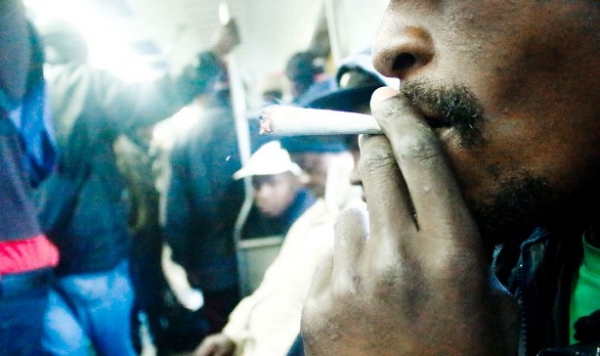Like inhaling smoke? Ride Metrorail.

A complete disregard for the no-smoking notices and rules on Metrorail trains and at stations by many commuters poses a daily health hazard to thousands of their fellow travellers. And Metrorail appears powerless to enforce the law.
Kuhle Mafanya takes the train from Fish Hoek to Retreat every day. He says it is unfair that Metrorail apparently does nothing about the people that smoke in the trains.
“I don’t smoke, but people smoke in front of me knowing very well that they are not allowed to, and the people working for Metrorail don’t do anything about it.
“I have to move away to find a spot that has no one smoking. Why should I do that when people know they are not supposed to smoke? It’s because they know nothing will happen to them,” says Mafanya.
According to the World Health Organisation more than 600,000 deaths per year worldwide are caused by secondhand smoke.
Dr Yussuf Saloojee, executive director of the National Council against Smoking, says that in confined public places like trains and buses the levels of pollution from smoke can reach levels high enough to provoke a heart attack or an asthma attack in someone who is vulnerable.
“The National Council against Smoking believes that the right of the non-smoker to clean air is more important than the right of others to pollute the air … It supports a complete ban on smoking indoors, and in some outdoor areas like railway platforms and sports stadiums. This is the best way to protect the health of the public,” says Saloojee.
Secondhand smoke can cause numerous health problems in children and adults, including more frequent and severe asthma attacks, respiratory infections, heart disease, stroke, and lung cancer according to the Centers for Disease Control and Prevention.
There are penalties associated with anti-smoking legislation in South Africa, including fines for both the smoker and the venue operator.
Mayoral Committee Member for Health Councillor Siyabulela Mamkeli says the current fines for people smoking in public places are R200 for the first offence and R300 for a second offence, as approved by the Municipal Magistrate Committee.
“Act 23 of 2007, Section 2 (1) (a) determines that ‘No person may smoke any tobacco product in any indoor, enclosed or partially enclosed area which is open to the public, and includes a workplace and a public conveyance,”says Mamkeli.
Fines for companies who ignore this Act are set at R2,000 for a first offence and R2,500 for a second offence.
In 2009, government also banned smoking in partially enclosed public places such as covered patios, verandas, balconies, walkways and parking areas, as well as smoking in cars where there are children under the age of 12 present.
Nomawethu Mtyida, who travels from Philippi to Rondebosch for work, says the problem is so big one has to avoid certain carriages.
“I know never to catch the last carriage because it’s known as the smoking carriage. But sometimes you are forced to because it’s the only one that is not full … Some people even smoke between carriages. In two years of using the train, I have never seen anyone from Metrorail telling them to put out their cigarettes,” says Mtyida.
Metrorail spokesperson Riana Scott said smoking on trains and stations is regulated primarily by the Legal Succession [to the South African Transport Services] Act which prohibits smoking in railway precincts.
She said that there is no such thing as a smokers coach; all trains are smoke-free zones.
“It is an old and defunct arrangement that preceded current anti-smoking laws. Our employees and security staff must warn smokers to desist … Metrorail employees are not mandated to fine offenders like municipal officials [may] when municipal by-laws are contravened. They may warn smokers to desist and may affect a citizen’s arrest if smokers refuse to comply with a legitimate request,” said Scott.
Next: Mitchells Plain families face winter eviction
Previous: Lost belongings after evictions: a chaotic blame game

This article is licensed under a Creative Commons Attribution-NoDerivatives 4.0 International License.


